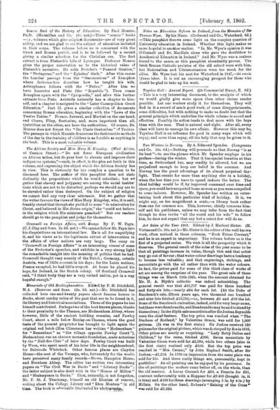Source Book of the History of Education. By Paul Monroe,
Ph.D. (Macmillan and CO.' 203. net.)—These " source " books e , volumes which give originrd documents—are of very great utility, and we are glad to see the subject of education included in their scope. The volume before us is concerned with the Greek and Roman period, and is to be followed by a second giving a similar selection for the Christian era. The first extract is from Plutarch'a Life of Lycurgus. Professor Monroe gives the proper reservation as to the historical value ef Plutarch's narrative. He adds Pericles's " Funeral Oration," the " Protagoras," and the " Ephebes' Oath." After this comes the familiar passage from the " Oeconomicus" of Xenophou where Ischomaehus describes how he taught his wife. Aristophanes follows with the " Nubes." After him we have Isocrates and Plato (the " Republic "). Then comes Xenophon again with the " Cyroptedia," and after this further extracts from Plato. Aristotle naturally has a chapter to him- self, and a chapter is assigned to the "Later Cosmopolitan Greek Education." Part II. gives a similar collection of documents concerning Roman education, beginning with the "Laws of the Twelve Tables." Horace, Juvenal, and Martial on the one hand, and Cicero, Pliny, Suetonius, and, more important than all, Quintilian on the other, are here the authorities. Of course, Dr. Monroe does not forget the "Do Claris Oratoribus " of Tacitus, The passage in which Messala denounces the fashionable methods of the day in the training of children is as forcible as anything in the book. This is a most valuable volume.










































 Previous page
Previous page